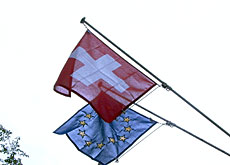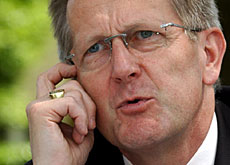Government rejects mandatory Schengen vote

The government wants none of the nine treaties agreed with the European Union last month to be put to mandatory nationwide votes.
The second set of bilateral agreements includes the controversial Schengen accord, which governs cross-border crime.
While the Social Democratic, Radical and Christian Democratic parties welcomed Wednesday’s decision, the rightwing Swiss People’s Party called it a “scandal”.
The People’s Party is opposed to plans for security cooperation with Brussels saying Switzerland’s sovereignty was at risk.
The decision means that opponents of Schengen, in particular the People’s Party and the isolationist Campaign for an Independent and Neutral Switzerland (CINS), will have to collect 50,000 signatures to force a vote on the issue.
The government would probably have an easier time pushing through the Schengen accord in such a ballot, which only requires a majority of the people. A mandatory vote, however, would require a majority of both voters and cantons.
Hans Fehr, head of CINS, said he believed the decision was not only anti-democratic but also ran contrary to the constitution.
“The government wants to join the EU at all costs by way of Schengen,” he argued.
Package of accords
Seven of the nine accords will now form a package that has to win parliamentary and possibly electoral support.
The two remaining accords – on processed agricultural products, and on education, occupational training and youth – are not required to go to a nationwide vote.
As a non-EU member, Switzerland has had to hammer out bilateral treaties with Brussels after the Swiss rejected membership of the European Economic Area in 1992.
At its regular weekly meeting, the cabinet said that none of the texts of the accords merited being put to a mandatory referendum, arguing that they did not require Switzerland to join a collective security organisation or a supranational body.
The government noted that Schengen was not an organisation but a form of international cooperation.
Later this year parliament is due to discuss the bilaterals before some are possibly put to the people in a vote.
Besides Schengen and Dublin, the accords concern statistics, pensions, media, the environment, the fight against fraud and the taxation of savings.
swissinfo with agencies
The Swiss government has come out against a compulsory nationwide vote on the controversial Schengen accord in the Bilaterals II treaties with the EU.
The rightwing Swiss People’s Party and the Campaign for an Independent and Neutral Switzerland have opposed the decision and pledged to force a vote by collecting at least 50,000 signatures.

In compliance with the JTI standards
More: SWI swissinfo.ch certified by the Journalism Trust Initiative


You can find an overview of ongoing debates with our journalists here . Please join us!
If you want to start a conversation about a topic raised in this article or want to report factual errors, email us at english@swissinfo.ch.